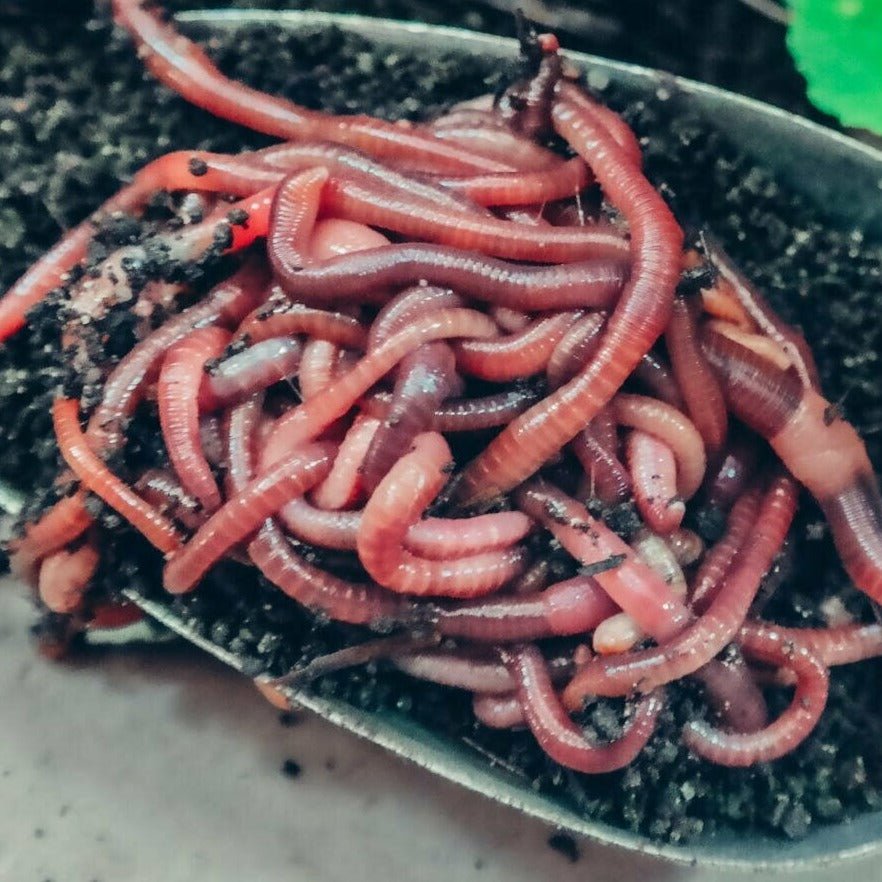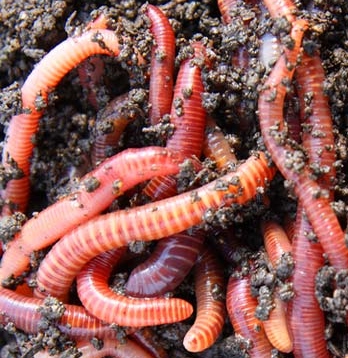Premium Top Quality Red Wiggler Worms - Boost Your Garden's Fertility
Premium Top Quality Red Wiggler Worms - Boost Your Garden's Fertility
Blog Article
Red Wiggler Worms Demystified: Unlocking the Secrets of Vermiculture for Greener Living and Nutrient-Rich Dirt
In the world of lasting methods for enhancing soil quality and advertising eco-conscious living, red wiggler worms play a pivotal yet frequently neglected function. These simple creatures possess the remarkable capacity to change organic waste right into nutrient-rich spreadings that serve as a potent natural fertilizer. By diving right into the world of vermiculture, one can uncover a myriad of advantages that extend far beyond conventional composting approaches. Understanding the complexities of caring for these worms, maximizing their atmosphere, and harnessing their spreadings can result in a greener lifestyle and much healthier soil for plants to prosper.
The Duty of Red Wiggler Worms
Red Wiggler worms play a vital function in composting systems by efficiently breaking down raw material into nutrient-rich castings. These ravenous eaters eat a selection of natural materials, such as kitchen scraps, backyard waste, and paper products. As they feed, the worms' gastrointestinal procedures damage down the organic issue into a fine, dark, and nutrient-dense material called worm spreadings or vermicompost.
The spreadings generated by Red Wiggler worms are very beneficial for dirt health and wellness and plant growth. They are rich in necessary nutrients like nitrogen, potassium, and phosphorus, which are essential for supporting healthy plant growth. Additionally, worm spreadings contain beneficial microbes and enzymes that help boost soil framework, increase water retention, and enhance nutrient uptake by plants.
Advantages of Vermicomposting

It boosts dirt structure, enhances soil aeration, and raises soil wetness retention. Vermicompost additionally enriches the dirt with essential nutrients like nitrogen, potassium, and phosphorus, promoting plant growth and general dirt fertility.
In addition, vermicomposting supports sustainable gardening methods by giving a natural and chemical-free option to artificial plant foods. Red Wiggler Worms. This eco pleasant approach not only enhances the dirt yet likewise aids lower reliance on unsafe chemicals, advertising a greener and a lot more lasting means of gardening
Establishing Up a Worm Container
When establishing a worm container for vermicomposting, correct arrangement is essential to make sure the success of the composting procedure. The initial step in establishing a worm bin is selecting an appropriate container. This can be a plastic bin or wooden box that offers enough area for the worms to move around and has proper drainage openings to stop waterlogging. Next, a bed linens material such as shredded newspaper, cardboard, or coconut coir should be included in the container. This bed linens gives a comfortable environment for the worms and helps maintain moisture levels.
After adding the bedding, introduce the red wiggler worms to the bin. It is suggested to begin with a little number of worms and progressively raise as they multiply. The worms should then be provided with food scraps such as fruit and veggie peels, coffee premises, and eggshells. It is vital to prevent including meat, milk, oily, or salty foods to avoid attracting pests and producing undesirable smells.
Routinely keep an eye on the dampness degrees and temperature in the worm bin to ensure optimal problems for the worms. With correct arrangement and upkeep, the worm bin will efficiently transform organic waste into nutrient-rich compost for your plants and garden.
Collecting Worm Castings
To efficiently collect nutrient-rich worm spreadings from your vermicomposting system, a systematic harvesting technique is crucial. When it comes time to harvest the worm spreadings, there are a couple of key actions to follow to make certain a successful procedure.

Troubleshooting Common Issues
Recognizing and dealing with common difficulties that might develop during the vermicomposting process is important for preserving a efficient and healthy worm bin. One common problem that vermicomposters experience is overfeeding. Including excess food scraps can cause an accumulation of wetness and acidity in the worm container, possibly hurting the worms. To stop this, feed the worms in moderation, making certain that the food scraps are adequately damaged down prior to adding more. An additional concern is unpleasant odors rising from the worm bin. Foul scents show anaerobic problems, generally triggered by overwatering or inadequate air flow. view To treat this, readjust the moisture levels by adding completely dry bedding materials like shredded paper or cardboard and rise aeration by transforming the bedding routinely.
In addition, if the worm populace is declining or the worms show up unhealthy, it could be because of environmental stressors such as extreme temperatures or pH degrees. Monitoring these factors and making necessary modifications is necessary for the well-being of the worms. By troubleshooting these common issues immediately, vermicomposters can guarantee a effective and smooth vermicomposting process while keeping a growing worm population.

Final Thought
In final thought, red wiggler worms play a critical function in vermiculture by breaking down natural matter into nutrient-rich soil. Setting up a worm bin is essential for successful vermiculture, and collecting worm castings offers important compost for gardening.
As they feed, the worms' gastrointestinal processes break down the natural matter into a penalty, dark, and nutrient-dense product understood as worm spreadings click here to read or vermicompost.
The spreadings produced by Red Wiggler worms are highly helpful for soil health and plant development. Including excess food scraps can lead to a build-up of dampness and level of acidity in the worm bin, possibly harming the worms.In addition, if the worm population is decreasing or the worms appear harmful, it might be due to ecological stress factors such as severe temperature levels or pH degrees. Setting up a worm container is necessary for successful vermiculture, and gathering worm castings provides useful garden compost for gardening.
Report this page